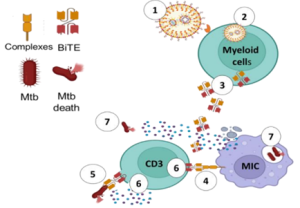mRNA – From Vaccines to the Fight Against Tuberculosis
Researchers from the Technion's Faculty of Biology will develop a new approach to combating infectious diseases. Their work, which is part of the newly formed European NanoBiCar consortium, marks the first attempt to use mRNA molecules against tuberculosis and other bacterial diseases in response to the growing problem of antibiotic resistance
The consortium will develop innovative treatments for bacterial infections in general and drug-resistant tuberculosis in particular. It includes Prof. Yoram Reiter’s research group and researchers from universities and research institutes in Israel, Spain, the Netherlands, and France. Dr. Maya Cohen, the lab manager, and Dr. Maya Linial, who will conduct postdoctoral research as part of the initiative, are leading the project in Prof. Reiter’s lab.

Bacterial infections are responsible for about 20% of global deaths, with tuberculosis being the deadliest disease caused by a single bacterium. According to an October 2024 report by the World Health Organization, tuberculosis claims approximately 1.25 million lives annually. While 95% of active tuberculosis cases occur in the developing world, recent large-scale migration to the West has led to an increase in cases in Europe. In Israel, tuberculosis cases are occasionally diagnosed, prompting the establishment of the National Tuberculosis Eradication Program in 1997.
Tuberculosis primarily affects the lungs, but can also impact the brain, spine, and kidneys. It is caused by the bacterium Mycobacterium tuberculosis. Due to the widespread use of antibiotics to treat tuberculosis, the bacterium has developed increasing resistance to these treatments. The new consortium will tackle this challenge using mRNA molecules encased in lipid nanoparticles. These combined particles will stimulate the immune system, enabling it to attack the tuberculosis bacterium effectively and safely – without triggering antibiotic resistance.

mRNA molecules became widely known in the context of vaccines, particularly during the COVID-19 pandemic. The treatment developed by the consortium will mark the first-ever use of mRNA molecules against bacterial infections. Unlike antibiotics, which can harm essential bacterial populations and drive resistance, this new approach leverages the human immune system’s specificity and efficiency to combat bacteria safely. This concept is aligned with the principles behind immunotherapy, which enhances the immune system’s ability to fight cancer – a field in which Prof. Reiter has been active for many years.
As part of the project, the treatment will be tested across three stages of tuberculosis: latent (affecting a quarter of the world’s population), acute, and chronic. While the initial focus is on tuberculosis, researchers believe the technology could be applied to other bacterial infections, reducing problematic antibiotic use. The treatment will be especially beneficial for immunocompromised patients and underserved populations lacking access to advanced medical care.
The European Union funds the consortium through the Horizon Europe program under the European Innovation Council (EIC) Pathfinder program, an initiative supporting high-risk fundamental research expected to pave the way for breakthrough technologies. This prestigious program funds only about 4% of proposals, with NanoBiCar selected as one of 40 projects from over 1,000 submissions.



